- Home
- Nancy Pickard
The Virgin of Small Plains Page 11
The Virgin of Small Plains Read online
Page 11
Chapter Twelve
Memorial Day. All sorts of people went home for Memorial Day.
That’s what Mitch Newquist told himself as he stood with one hand on the gas pump and his other hand propped on the side of his Saab. As gasoline poured into the tank, he stared at a highway marker at the entrance to an interstate only a few dozen yards away, and tried to make up his mind. Go? Not go?
“Your mother passed away yesterday, Mitch,” was how the phone call from his father had begun. That had been way back at the end of January. It was now Memorial Day, the last day of May. “She got confused and wandered out into the blizzard last night. Rex Shellenberger and Abby Reynolds found her in the cemetery behind our house. She froze to death. I thought you’d want to know.”
Mitch hadn’t known whether to laugh or cry. His mother was dead, which ought to produce tears, he supposed. His father had “thought you’d want to know.” Which was almost as “funny” as his dad using Rex and Abby’s last names, as if Mitch wouldn’t have recognized them otherwise.
He had supposed, as he had stood in his house holding his telephone and not saying anything, that “funny” was the wrong word to use to describe his father’s approach to him, but he was damned if he could think of the right one. Ironic? Gratuitous? Finally, he landed on “cruel,” which seemed—and felt—accurate.
“What was she doing out in the snow?” he asked his father.
“One of the damned nurses left the back door unlocked.”
“I’m sorry. When is the funeral?”
“Tuesday. You think you’ll come?”
“I don’t know, Dad. I’ll think about it.”
“If you have to think about it,” his father said, sounding suddenly cold and furious, “then don’t bother coming. She was your mother, for heaven’s sake.”
Mitch stood alone in his house and shook his head over the old man’s words to him. It was unbelievable. Feeling the old bitter resentment and fury rise, he retorted with all the heat that had been missing from his father’s tone. “You don’t think there’s anything to think about, Dad? Nothing at all to consider before I come back? Doc will be at her funeral, won’t he? And Nathan. You seriously think there’s no good reason to think about anything before I just show up there?”
“Bygones,” his father shot back at him.
“Bygones?” Mitch laughed, a loud, bitter bark of laughter. “You’ve got to be kidding me. Those two sons a bitches lied about me. They were going to accuse me of murder. They ruined my life, or would have if I had let them do it, and neither you nor my mother raised a hand to help me defend myself against them.”
“What are you talking about? We got you out of town!”
“Ran me out of town, you mean.”
“We put you in a good school, we saw to your every need…”
“Stop. Just stop. Do you really think I can just sail back into town and let bygones be bygones?”
“Do as you please, Mitch,” his father said, and hung up on him.
When he called his father back to say he wasn’t going, Mitch had not felt any need to explain his decision. He didn’t tell the old man that he had realized that if he went back after all these years he would become the center of attention instead of the woman whose funeral it was. Mitch had given his mother the only measure of respect he knew she would appreciate: He had allowed her funeral to be all about her. And he had decided he would drive down on the next Memorial Day to see the grave, when nobody was expecting him, and he would stay out of everybody’s way, and there wouldn’t be any fuss.
At least, that was the plan.
He was halfway to fulfilling it. More than halfway, actually, since he stood at the intersection of I-70 and Highway 177. To the north was Manhattan, to the west lay Denver, and toward the east was Kansas City, where he had lived for the past seven years. Small Plains was straight south from where he stood. If he remembered correctly, the cemetery was on 177 north of town. He could run in, take a look, and then get right back in his car and head home without even having to drive through Small Plains. There were only a few more miles to go to get there, and then he’d be done with it. But what was the point of this trip, he asked himself for the hundredth time? Hell, he wasn’t even taking flowers, because he didn’t want to leave any sign he’d been there. Whether or not he visited made no difference to his mother now, and maybe had never made any difference to her. And nobody else, including his father, would ever know, so why go at all?
“You’re being ridiculous,” he told himself.
He was going because something inside of himself demanded it.
Some hole in him needed to be filled by the basic act of standing at his mother’s grave, that was all.
The pump clicked, telling him the tank was full. He replaced it in the holder, took his receipt, shook his head over the price, and then got back behind the wheel, his hands smelling of gasoline. But as he drove toward the ramp with four choices of directions he still didn’t know which one he would take—until the Saab seemed to point itself straight south.
Within minutes, he was driving deep into the Flint Hills, where he was born.
It wasn’t the only time that day that events seemed to take him over.
At no point on the drive from Kansas City did Mitch ever once entertain the idea that Abby’s face might be the first he’d see upon arriving back “home.” If anything, he hoped to avoid her, altogether. But when he happened to notice a green-and-white sign with an arrow that said ABBY’S LAWN & LANDSCAPE, and it was only two miles from town on Highway 177, his turn signal seemed to go on by itself. Again, his car seemed to have a mind of its own, turning off the highway and then maneuvering onto a narrow, paved street, which quickly turned into a dirt and gravel road.
And suddenly, there he was, kicking up dust behind him, like a farmer.
Just because the sign had her first name on it didn’t mean it was her business.
Or any business of his, he reminded himself.
But still his car kept going down the road that was lined on either side by brown fence posts strung with barbed wire. He remembered what it felt like to dig holes for posts like those, and to drive them in all day. He remembered the feel of the thick leather gloves the men wore to handle the wire, and the cuts and blisters he used to get in spite of the gloves. He recalled the huge, greasy, delicious noontime meals the “hands” ate, all stopping work at the same time to troop into a ranch woman’s kitchen or into the café in town.
The grassy fields were full of wildflowers he couldn’t identify—purple, yellow, pink, and white ones. Red-and-white Hereford cattle dotted the fields on one side of him; black-and-white cattle, a Hereford and Angus mix, grazed on the other side. Every now and then his wheels scared birds out of the grass on the shoulder. The birds—meadowlarks? Mitch almost remembered what they were—fluttered up and away from him.
He found himself regretting his urge to come now, when the Flint Hills were at their most stunning, especially now in the fresh light of a spring morning. He’d forgotten how gorgeous this area could be at certain times of year, in certain light, in pleasant weather. Maybe he hadn’t even noticed the beauty when he was a kid. Maybe it had been something he had taken for granted, like fresh eggs, rodeos, and dogs that were allowed to run loose. But now, seeing it so many years later, and through adult eyes, it struck him that he had lived his childhood in the heart of an impressionist painting. It galled him to have to admire it. He wished he had come, instead, in the midst of harsh winter or searing summer, when only a diehard Kansan could have loved the daunting landscape.
Mitch rolled his car windows down to let the fresh air flow through.
His ears ate up the sounds of his wheels moving over gravel, of wind through grass, of birds and insects singing. He stopped the car in the middle of the road and turned off the engine, craving to hear more.
After a few moments, he started the car again.
In the few hundred yards since he had turned off the h
ighway, he had learned that the trip was going to be painful in ways he hadn’t expected. He had forgotten how much he had loved a lot of his own childhood, how good it had felt to live in the heart of a huge country, with land spreading out in every direction. He had forgotten what it was like to climb to the top of one of the high flat hills and be able to see into four counties, what it was like to be able to walk or ride anywhere for miles around, and always run into people who knew him. He had forgotten what it was like to feel safe. He had forgotten what it was like to feel loved, if not convincingly by his own parents, then by an entire community.
It was too painful. He nearly turned the car around to go back to the city.
But then he saw a second small green-and-white sign with an arrow pointing north.
He already had on dark sunglasses. Now he reached across his car seat to grab his Kansas City Royals baseball cap and put it on. He felt slightly idiotic, like a spy in disguise. But the last thing he wanted was a sudden meeting with the girl he’d left behind. If “Abby’s Lawn & Landscape” was that Abby, and she happened to be driving down this road going the other way, he wanted to be able to sail past her without being recognized.
The girl he’d left behind…in bed.
Cut that shit out, he told himself. But not before an image of a naked sixteen-year-old girl flashed through his inner vision, making him feel like a dirty old man.
Mitch tugged the brim of his cap down tighter over his forehead.
He realized he was there. Just ahead on his left, there was a fenced property on which he saw a small white house with green shutters, a screened-in porch to one side, and a front porch with a white swing on it. He also spotted a barn that had been converted into a plant nursery. He saw an entire field of young trees and shrubs, and what looked like a field of wildflowers that had been planted on purpose.
It was attractive, in a rural, struggling kind of way.
The house and barn could have used a coat of paint. A black truck parked at the side of the house looked the worse for wear, though there was a shinier, bigger, newer red truck parked beside it. It looked like the kind of place where the owners had to work their tails off to keep it going.
He had slowed down as he approached it, and now he stopped.
Just as he was about to speed up and move on past quickly so that he could turn around and leave, the door of the side porch flew open and a man came barreling out of it, and let the screen door slam behind him. He had the look of a cowboy, down to the boots in his hands. He was a good-looking guy, tall and muscular. He looked like he had some miles on him, as Mitch remembered his father used to say of men who drank too hard and traveled too fast. He was walking in his stocking feet over the gravel in the driveway as if he was too pissed off to feel the rocks. Suddenly, Mitch recognized him. Jesus Christ, it was Patrick Shellenberger, Rex’s asshole of an older brother.
Abby had married Patrick?
Before Mitch could even consider what that might mean, the screen door opened again and there she was. The sun had come up just enough to illuminate her face.
Mitch’s heart stopped in his chest.
It was Abby, almost exactly as he remembered her.
She yelled something after the departing Patrick, who raised an arm in reply.
Mitch saw her grin behind Patrick’s back, and pain shot through him.
She was still as pretty as she had ever been. And judging from the way his heart was pounding, it seemed to think it still belonged to her.
Damned, stupid, foolish heart, he thought.
Quickly, he stepped on the gas so he could glide as unobtrusively as possible past the entrance to their property, before Patrick had time to steer the red truck down the drive.
Mitch drove for several miles, not paying attention to where he was going, or how long it took him to get there. As his wheels bumped over the rough roads, all he could think of as they turned was what he had lost, lost, lost. Everything, he had lost it all. His dreams, his expectations, his hopes, his illusions. He had lost his home and family, his friends, his high school, his college, his girl. He had lost his innocence and his childhood. He had lost faith. He had lost trust. He had lost hope. Over time, through the years, he had regrouped, tried to rebuild a life, to make it all up to himself by gathering around himself the things and people who might do, instead. But here he was, after all of that, and the only thing he felt was the bitter loss of it all. Maybe he would never have married Abby. Maybe he wouldn’t have stayed in Small Plains anyway. Maybe he and his parents would have ended up estranged from each other over something else. But he would have had some choice in those possibilities, he would have had some power over them.
Finally, he stopped, turned around, and drove back the way he had come.
When he passed the green-and-white house again, there was nobody in sight.
Mitch drove through the dust that Patrick’s truck had raised.
Back at the highway, he looked northeast toward Kansas City and then south toward Small Plains. Again, he thought about turning back. What difference would it make for him to see his mother’s grave? What was a five-minute visit going to satisfy in him that still needed satisfying?
“You can’t know until you get there,” he reminded himself.
He had not grown up to be the man he had thought he would be. Events had changed him, or he had allowed them to change him. It hadn’t even occurred to him before this morning that the same thing might have happened to Abby. She, too, must have hardened and coarsened over the years. The girl he had loved could never have grown up to marry someone like Patrick Shellenberger. It just couldn’t have happened, not the way their lives had been going back then, not as the people they were growing up to be, back then. The old Abby might not even like the present me, Mitch realized, as his hand hovered over his turn signal. The Abby he remembered might not want anything to do with the ambitious, driven man he had become. But then, she wouldn’t have wanted anything to do with Patrick, either, and yet there he was. So, okay, she wouldn’t like me now…but why would I want anything to do with that disappointing woman in the doorway?
Mitch signaled a right turn, toward the Small Plains Memorial Cemetery.
Chapter Thirteen
At the Stagecoach Inn on the east side of Small Plains, the day manager stared helplessly at a young woman in a wheelchair, and apologized for having no room for her.
“I’m real sorry,” he said, and meant it, because he hated losing any chance at a $37-a-night room rate. “I just don’t have any more handicap-accessible rooms left. I swear, we can go months without needing a one of them, and here all of a sudden, it seems like that’s all anybody wants. It’s because of Memorial Day. Some family reunions going on. I do have a few rooms left, but there’s no elevator, and somebody would have to carry you up there, and I don’t know who’d do that. I can’t, not with my back, although I sure would, if I could,” he said, sincerely. “I’m awful sorry. Last I heard, the Econo Lodge was all full up, too, and I mean, completely full up, but I could call there for you, if you’d like.”
“Would you please?” she asked him.
She was really sick. He could tell that by how gray she looked, and bent over, like it was all she could do to sit upright, even with the help of the chair. Plus, the dead giveaway to him was the scarf she wore all around her head, which probably meant she was bald underneath there, and most likely on chemo for cancer, or something. She was traveling alone, which the other people who’d come in this week needing handicapped rooms had not been. They had relatives or friends with them. This poor young thing had driven up in a brown van and had to honk to get somebody to finally come and help her out of it. She must be really desperate, he thought. He imagined he smelled something medicinal. He thought she looked at death’s door, so while he would have liked to help her, and would have really liked to get the room rate, he was just as glad to send her elsewhere. He didn’t want to have to worry about what his maids might find when they walked into
her room in the morning. Not meaning to be offensive, he assured himself, but he hadn’t gotten into the motel business to run a morgue.
“I’ll just call over to the Econo right now,” he assured her. “If they can’t take you, there’s a bed-and-breakfast that might be able to, but I got to warn you, it’s more expensive, although why it should be, since all the furniture’s so old it creaks, I don’t know—”
“I’ll take anything,” she whispered. “Thank you.”
“They only serve breakfast.”
“That’s okay.”
He guessed that meant she didn’t eat much and probably couldn’t taste it anyway.
As he waited for a desk clerk to pick up the phone at the other motel, he asked conversationally, “So, do you have family around here?”
“No,” she said. “I don’t know anybody.”
That surprised him. Usually, they knew somebody.
“Well, then, what brings you out here in the middle of nowhere?”
He was pretty sure he knew what she was going to say, if she was honest enough to say it. When strangers showed up out of nowhere…sick strangers…it could only mean one thing, which was they’d somehow heard about the Virgin and they were here to see if they could get healed. It was amazing, he thought, how word could spread until his own little hometown got a reputation like it was some kind of one-stop shop for miracles.
“I’m going to the cemetery,” she said in her faint voice.
“To see the Virgin?” he asked, with a sympathetic and knowing glance.
She looked embarrassed and even turned a little pink, but she nodded.
“How’d you hear about her?”
“The Internet.”
“Really!” This was a new one to him.
Again, she nodded. “There are chat rooms about…miracles.”
“I’ll be darned.”
“Is it true…about the miracles?”
“Well, I’ve heard some stories, that’s for sure.”
He was careful to be vague. On the one hand, he didn’t want to make any promises and get sued. But on the other hand, the Virgin, in her small way, was good for business. And in a small town in the heart of Kansas, they could use any commerce that came their way.

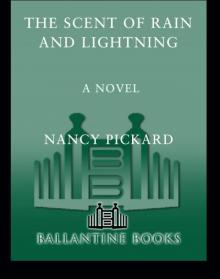 The Scent of Rain and Lightning
The Scent of Rain and Lightning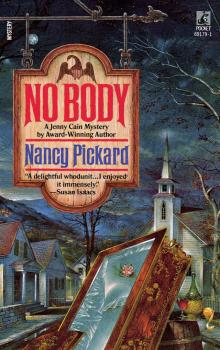 No Body
No Body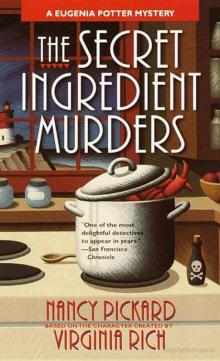 The Secret Ingredient Murders: A Eugenia Potter Mystery
The Secret Ingredient Murders: A Eugenia Potter Mystery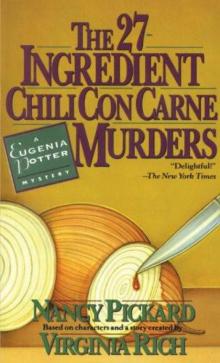 The 27-Ingredient Chili Con Carne Murders: A Eugenia Potter Mystery
The 27-Ingredient Chili Con Carne Murders: A Eugenia Potter Mystery Twilight
Twilight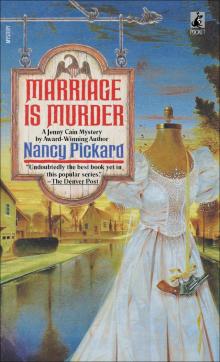 Marriage Is Murder
Marriage Is Murder I.O.U
I.O.U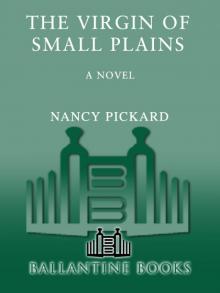 The Virgin of Small Plains
The Virgin of Small Plains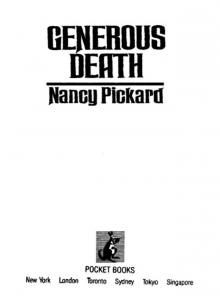 Generous Death
Generous Death The Whole Truth
The Whole Truth The Blue Corn Murders
The Blue Corn Murders Say No to Murder
Say No to Murder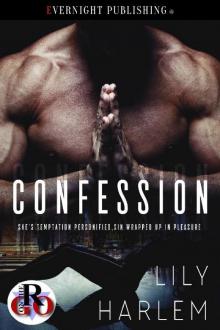 Confession
Confession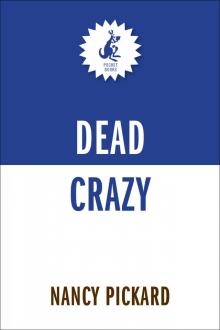 Dead Crazy
Dead Crazy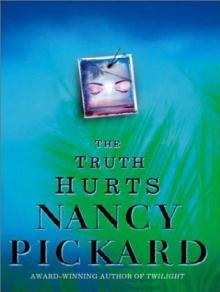 The Truth Hurts
The Truth Hurts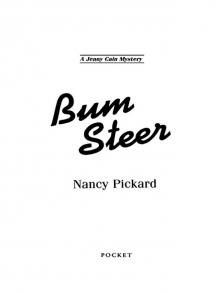 Bum Steer
Bum Steer